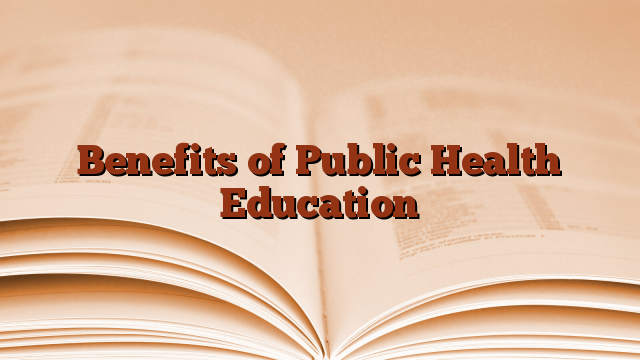Public health education can be seen as an ambiguous term. It teaches the right way to improve one’s health and can affect just one or two people or the populations of several countries. Anything that can seriously endanger the physical, mental or emotional health of a wide range of people, particularly as a result of their interactions with each other, can be classified as a community public health threat. Because of this, public health education is becoming a necessary tool to help people against the spread of potential illnesses and diseases. Five of the top reasons why public health education can prove beneficial are as follows:
1. People can learn how to prevent the spread of communicable diseases through training and methods taught in education. People have better access to information on general disease prevention, including knowledge of what to do and how to act when there are epidemics in their area. Certain diseases have their own individual prevention methods that people should know well, and using these techniques reduces the risk of contracting possible diseases. Through public health education, even simple things like wearing a flu mask in particularly affected areas, or knowing when to get vaccinated against a particular disease that is prevalent at that time of year, always prove very effective in reducing the number of people infected Affected limit annually.
2. More people have access to private and public medical facilities to prevent or better treat diseases or conditions. Without the benefits of public health education, most people may feel healthy enough and see no need to go for a general physical. Being aware of the need to see your doctor regularly is one of the important things learned in good public health education. Most medical hospitals and clinics provide vaccinations or vaccinations during flu season or during a general hepatitis outbreak, and public health education ensures more people know to visit these facilities and seek treatment, reducing the number of vaccinations is reduced amount of sick people.
3. People are able to adopt healthier behaviors to reduce the risk of spreading diseases among themselves. Keeping the house cleaner, reducing or quitting smoking, and getting more exercise are just a few of the many different methods taught in public health education to fight disease and improve one’s lifestyle.
4. People are becoming more aware of the information about the disease instead of just believing in the public perception. Public health education not only deals with disease prevention but also provides details of how a disease works, which can dispel some myths and misconceptions about it in society. For example, the HIV virus can be transmitted through unprotected sex, but not through activities such as kissing or touching. This also helps change a person’s views towards an infected person, encouraging more empathy rather than discrimination.
5. People can help and contribute to disease prevention by supporting healthcare organizations or by volunteering. Public health education is more than just disseminating information; It also calls on people to take an active part in helping others. In order to protect your own health, it is also necessary to protect the health of other people around you, and helps promote closer community and a better sense of camaraderie.
Thanks to Jes B | #Benefits #Public #Health #Education

Leave a Reply